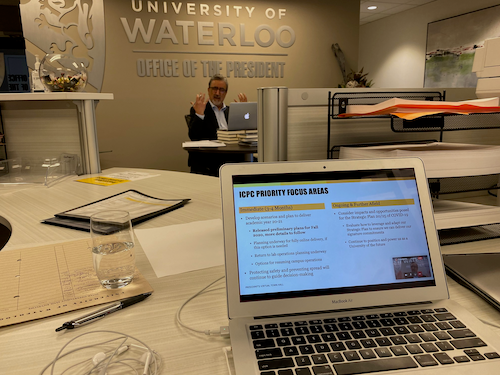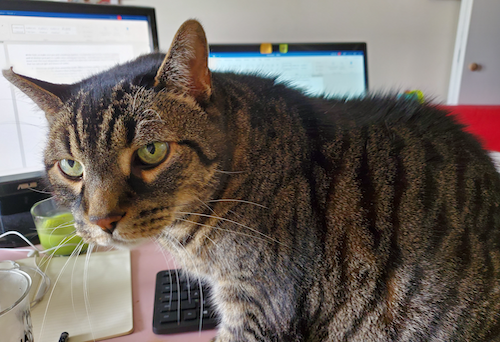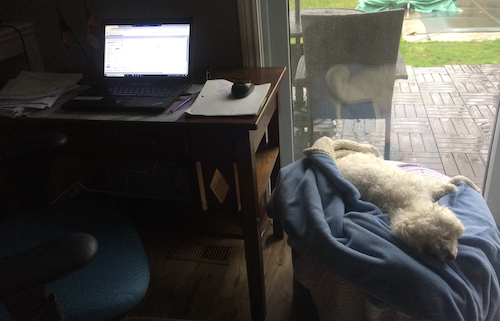Editor:
Brandon Sweet
University Communications
bulletin@uwaterloo.ca
The talk of the virtual town hall

More than 1,600 students, faculty, staff and community members logged on to the first-ever President's Virtual Town Hall Meeting on Wednesday, May 20.
"It’s the tenth week since we pushed the emergency button and since then we haven’t had the chance to be present on this campus together," said President Hamdullahpur, "but even though you weren't present I could feel your presence day in and day out."
"This is in no way intended to replace our more intimate gatherings at Fed Hall in the form of a town hall but nevertheless it’s an opportunity to hear from each other in a face to face opportunity to tell us what we know, what are the things that are of concern, what we're anxious and worried about, and what are the things that we are so proud," the president continued. "Not only have we been able to deal with this pandemic but also we are contributing to a better future for ourselves, for our institution, for our students."
"In moving forward, I want us to remember that we are here to deliver our core mission that includes serving and educating our students and creating new knowledge for the good of society and the betterment of Canada and the world," President Hamdullahpur said. "Those are at the core of our mission and in order to do this we must be much better prepared moving forward."
In his presentation, President Hamdullahpur outlined how the public health crisis has become an economic crisis, with impacts on university operations and future enrollments. He noted how University staff are working tirelessly to ensure that students are placed in co-op positions this term, and how University leaders are shifting from an emergency footing to a pandemic planning footing.
President Hamdullahpur also gave an update on the University's plans for the fall term, indicating that public health advice would help guide University administrators in decisions about what sizes of classes would be offered online and which ones would be held in-person on campus, and also spoke about the budgetary decisions that would see all campus operations hold back 15 per cent of their budgets this fiscal year in anticipation of the uncertain funding environment facing the University later in 2020.
Following the president's presentation, a Q&A period commenced, with President Hamdullahpur and members of the University's leadership fielding questions on a number of topics including the Fall term, co-op employment, campus study spaces, residence applications, tuition for international students, student mental health, return to work for employees, deferment of acceptance, and more.
"Thank you so much," said the President at the close of the event. "I sincerely hope that our next encounter will include an in-person interaction but in the meantime, this technology proves that it works... Be safe everybody, thank you so much, and I hope to see everybody soon."
For those of you who missed it, please view the recap on YouTube:
Answers to the questions that were posed to the President and the University's senior leadership will be added to the President's Town Hall website. Participants who sent questions in advance will be receiving an email with their answer from the townhall@uwaterloo.ca email account.
Canada is in a deep recession and should expect a long recovery, says expert panel

This article originally appeared on Waterloo Stories.
The economic impact of COVID-19 will be long, difficult and will discriminate, according to experts who participated in a panel hosted by the University of Waterloo.
In the first of a series of panels on the economic impacts of COVID-19, rebooting the economy, research experts and business leaders believe Canada needs to be prepared for a deep recession followed by a long recovery.
Panel members also highlighted that the negative impacts of COVID’s economic crisis will not impact society equally having so far disproportionately impacted women.
The panel series is part of the work being done by Waterloo’s Gateway for Enterprises to Discover Innovation (GEDI) at Waterloo program.
"What we're likely to see is a very deep recession followed by a very slow and drawn-out recovery," said Craig Alexander, the chief economist at Deloitte Canada. "The reason that recovery is going to be slow is that we're only going to gradually re-open the economy and it won't be business as usual."
Alexander’s perspective was shared by Joel Blit, an associate professor of economics at Waterloo who added that the Canadian economy was in a high-risk position before COVID-19 with inflated asset prices and a high level of personal debt.
Alexander and Blit were joined on the panel by Nada Basir, a professor at the Conrad School of Entrepreneurship and Business, Sanjeev Gill, Waterloo’s Associate Vice-President of Innovation and Lifelong Learning, Alex Goryachev, the managing director of Cisco Global Co-Innovation Centres, and Joel Blit, an associate professor of economics at Waterloo.
The panel was chaired by Bessma Momani, a political science professor at Waterloo.
“As global and widespread as this crisis is, its impact has been disproportionate,” said Basir. “Some people are at higher risk for health reasons, socio-economic factors and some countries, businesses and industries have been hit harder than others.
“My real worry is that small and medium sized industries, 70 per cent of our jobs, will not have access to government bailouts,” she said. “Smaller companies are experiencing the worst layoffs, in the double digits, and if you dig a little further it’s jobs held by women that are most impacted with two-third of laid of workers being female.”
The economy, according to members of the panel, may not resemble the one we were used to. Moving forward, Canadians should expect increased automation displacing further jobs and the increased penetration of Internet technologies in business, education, healthcare.
GEDI is set to host a further expert panels on the topics of supply chain management, data security, research to tackle real-world problems and Canada’s virtual future.
Q&A with the experts: food security and the food chain during COVID-19
The University of Waterloo has a number of experts available for comment on various aspects of the COVID-19 pandemic.
Staples like flour and toilet paper have been in short supply at various points during the COVID-19 pandemic. Will we see more bare grocery store shelves? Will the price of food increase as this pandemic drags on?
Jodi Koberinski of Waterloo’s Geography and Environmental Management department answers our questions about the food chain here.
How is our food supply chain affected by COVID-19?
In every corner of the web that is our food system, we see impacts: disruptions in farm labour globally, processing bottlenecks and retail and food service disruption. Food is social — sporting events and weddings and all things on hold also impact food workers and ultimately farmers.
Food is now visibly an essential service.
Why are dairy farmers dumping milk?
Food service, food processing, school meal programs from day school through Grad school, and fast food customers all stopped buying. All at once. The supply chain — due in part to consolidation, monopolization, and the pressures of a for-profit commodity provision of an essential service — can’t adapt so readily to home delivery, new packaging and shifting demands overnight. The sheer volume of daily processed dairy through these billion-dollar channels is astounding.
What happens if meat-processing stops?
Animals will be euthanized in many cases, others can be held within a production system but only for so long. Chickens and other animals raised for slaughter that live beyond a certain processing date may start to exhibit health issues and become a feed and crowding issue in systems designed for turn around. The dead animals may end up in some pet food systems but much will go to waste.
How is COVID-19 going to affect food pricing and availability as the economy slowly reopens?
Food pricing is expected to climb globally — we can look to the economic crash of 2008 for a reminder and recognize that every country is experiencing disruptions of some sort to greater or lesser degrees.
Inflation in produce has already begun.
Why are plants like Cargill so susceptible to such an outbreak?
Plants require workers to be in tight quarters during long shifts with what workers describe as inadequate PPE. Workers are in close contact during meal breaks — as well as in transport and in housing, which is exactly what we’re supposed to be avoiding when we’re asked to practice physical distancing.
Most workers are migrant or immigrant workers who earn very little for already risky work with little or no protection in the workplace. Fear of speaking up had impacted conditions in the largest plants.
Jodi Koberinski is a PhD candidate in the Department of Geography and Environmental Management. As a SSHRC fellow, Jodi is investigating novel governance approaches to food sovereignty in Canada with a focus on food as commons. Jodi is director and co-founder of the not for profit Earth Education League and is the current Chair of the Food Systems Roundtable of Waterloo Region.
Last but not least, the Good Buddies of the University

"Meet Hawk and Twyla!" writes Alyssa Dobranski, dean's office assistant in the Faculty of Applied Health Sciences. "We recently adopted Twyla, so it’s been a battle of the cats in our apartment. Thankfully Twyla is only ten weeks old and therefore naps A lot, which means I can get work done and Hawk can reclaim his throne (my lap). When they aren’t napping, they love to play 'hide the mice,' so you can almost count on a climbing into bed and finding a stuffed mouse under the sheets or in one or your shoes as you go to leave. Otherwise, they mostly chase each other around the apartment causing all kinds of chaos. They definitely make working from home much more entertaining! Thank goodness for our Good Buddies."

"Scooby and Oreo are not even mildly concerned over the emergency remote teaching going on around them," writes Professor Laura Deakin, associate director, internal - nanotechnology engineering in the Department of Chemistry.

"This is Horatio, who likes to watch over me as I work and does not approve of any tasks that take attention away from him," writes Elise Vist, speaking and digital communication, WCMS in the Writing and Communication Centre.

"My buddy Pearl is a 9-lb bichon/poodle and we love her dearly," writes Mila Kaufman, financial coordinator in Electrical & Computer Engineering. "All she wants is to be near me no matter what time of the day is."
Link of the day
25 years ago: Before The Matrix, there was Johnny Mnemonic
When and Where to get support
Students can visit the Student Success Office online for supports including academic development, international student resources, leadership development, exchange and study abroad, and opportunities to get involved.
Award from GSEF-GSA-GSPA for thesis-based master’s and PhD students who have lost funding because of COVID-19. Visit https://uwaterloo.ca/gspa/covid-19-updates-graduate-students for more details.
Instructors can visit the Keep Learning website to get support on adapting their teaching and learning plans for an online environment. The following workshops are current offerings from the KL team (CTE, CEL, ITMS, LIB):
ATLAS: Part 1, Monday, May 25, 1:00 p.m.
Using the Grades Tool in LEARN, Tuesday, May 26, 10:00 a.m.
Akindi Training Session,Tuesday, May 26, 1:00 p.m.
ATLAS: Part 2, Wednesday, May 27, 1:00 p.m.
Open Educational Resources (OER) Workshop: Copyright, Licensing, Searching, and Selection, Tuesday, May 26, 1:00 p.m.
Remote Course Design Essentials, Wednesday, June 3.
Using the Grades Tool in Learn, Wednesday, June 3, 1:00 p.m.
Employees can access resources to help them work remotely, including managing University records and privacy of personal information
Here are some tips for staying healthy while working from home:
The Writing and Communication Centre has gone virtual to provide assistance.
Grad Writing Cafés and #WaterlooWrites, self-registration on LEARN:
- Tuesdays: 9:00 a.m. to 12:00 p.m.
- Wednesdays: 2:00 p.m. to 4:30 p.m.
- Fridays: 9:00 a.m. to 12:00 p.m.
Virtual Drop-In Appointments, Tuesday, May 19 to Thursday, August 6, registration on WCONLINE
- Sunday - Thursday from 6:00 to 9:00 p.m.
- Sign up begins at 5:55 p.m.
- Closed for the holidays on July 1 and August 3
- Appointments are 25 minutes long
We understand that these circumstances can be troubling, and you may need to speak with someone for emotional support. Good2Talk is a post-secondary student helpline based in Ontario, Canada that is available to all students.
If you feel overwhelmed or anxious and need to talk to somebody, please contact the University’s Campus Wellness services, either Health Services or Counselling Services.
The Library has published a resource guide on how to avoid information overload.
The Faculty Association of the University of Waterloo (FAUW)continues to advocate for its members. Check out the FAUW blogfor more information.
The University of Waterloo Staff Association (UWSA) continues to advocate for its members. Check out the UWSA blog for more information.
WUSA supports for students:
Food Support Service food hampers are currently available from the Turnkey Desk on weekdays from 9:00 a.m. to 4:00 p.m. in the Student Life Centre. If you have any questions please email us at foodsupport@wusa.ca.
MATES – Providing general online Peer Support via Skype to undergraduate students. To set up an appointment, please contact mates@wusa.ca
Empower Me is a confidential mental health and wellness service that connects students with qualified counsellors 24/7. They can be reached at 1-844-741-6389.
Glow Centre - Providing online Peer Support for the LGBTQ2+ community via Skype to Undergraduate students. To set up an appointment, please contact glow@wusa.ca
The Women’s Centre – Providing online Peer Support via Skype to undergraduate students. To set up an appointment, please contact womenscentre@wusa.ca
RAISE – Providing online Peer Support via Skype to undergraduate students. To set up an appointment, please contact raise@wusa.ca.
Centre for Academic Policy Support - CAPS is here to assist Waterloo undergraduates throughout their experience in navigating academic policy in the instances of filing petitions, grievances and appeals. Please contact them at caps@wusa.ca . More information at http://wusa.ca/caps
WUSA Commissioners who can help in a variety of areas that students may be experiencing during this time:
- Equity – equity@wusa.ca
- Co-op and Experiential Affairs – coop.affairs@wusa.ca
WUSA Student Legal Protection Program - Seeking legal counsel can be intimidating, especially if it’s your first time facing a legal issue. The legal assistance helpline provides quick access to legal advice in any area of law, including criminal. Just call 1-833-202-4571.
When and Where (but mostly when)
Please note: The University has suspended all in-person events until further notice. Please contact the event organizers to confirm whether the event has shifted to an online mode of delivery.
Organizing a virtual event? Send an email to bulletin@uwaterloo.ca to have it featured in Where and When.
The Workplace Yoga Program is live-streaming classes on Tuesdays and Wednesdays from 12:05 p.m. to 12:50 p.m. in April and May.
Problem Lab pitch competition applications open, May 11 to June 7.
Akindi Live Training (Webinar), Tuesday, May 26, 1:00 p.m. to 2:00 p.m.
The Post-COVID-19 Reboot, “Rebooting: Supply Chain Considerations” (panel session 2 of 6) Wednesday, May 27, 1:00 p.m.
Concept Intro Session: Building Your Business during a Pandemic, Wednesday, May 27, 6:30 p.m.
International Student Online Discussion, Filing your taxes in Canada, Thursday, May 28, 9:00 a.m., online.
Science Innovation Hub Guest Lecture: Scientific Innovation and Entrepreneurship with Prof. Joseph Bondy-Denomy, Thursday, May 28, 2:00 p.m.
Warrior Rec Esports Registration now open until May 29. Eight leagues available (FIFA20, NHL20, NBA2K20, Madden20 for Playstation 4 or XboxOne). Only $5/entry.
Waterloo's Human-Computer Interaction labs (UWHCI) Present: WatCHI, a livestream event highlighting our contributions to HCI this year, Tuesday, May 29, 9:00 a.m. to 3:30 p.m. Visit watchi.live for schedule and stream info.
The Post-COVID-19 Reboot, “Rebooting: Security and data privacy considerations” (panel session 3 of 6), Tuesday, June 2, 1:00 p.m.
Human Rights, Equity and Inclusion Seminar, Equity 101,Wednesday, June 3, 9:00 a.m. to 12:00 p.m.
Q&A with the Science Innovation Hub Advisory Team,Wednesday June 3, 10:00 a.m.
Concept Intro Session: The Model Business, Wednesday, June 3, 6:30 p.m.
More Feet on the Ground Mental Health Training for Students, Thursday, June 4, 9:30 a.m., Microsoft Teams – Register on GoSignMeUp.
Concept $5K Applications Open, Monday, June 8.
Human Rights, Equity and Inclusion seminar, Policy 42 & You, Lunch and Learn on Policy 42: the Sexual Violence Prevention and Response Policy and Procedures, Tuesday, June 9, 12:00 noon to 1:00 p.m.
Science Innovation Hub Skills Development Workshop: Understanding a Paper, Wednesday June 10, 3:00 p.m. .
Conrad School of Business and Entrepreneurship presents “Meet the MBETs Information Sessions – Part-time MBETs,”Wednesday, June 10, 6:00 p.m. to 7:00 p.m.
Concept Intro Session: Validation Exploration, June 10, 6:30 p.m.
Human Rights, Equity and Inclusion seminar, Managing Difficult Conversations, Thursday, June 11, 9:00 a.m. to 12 noon.
The Post-COVID-19 Reboot, “Rebooting with Research: Tackling real-world problems” (panel session 4 of 6) Thursday, June 11, 1:00 p.m.